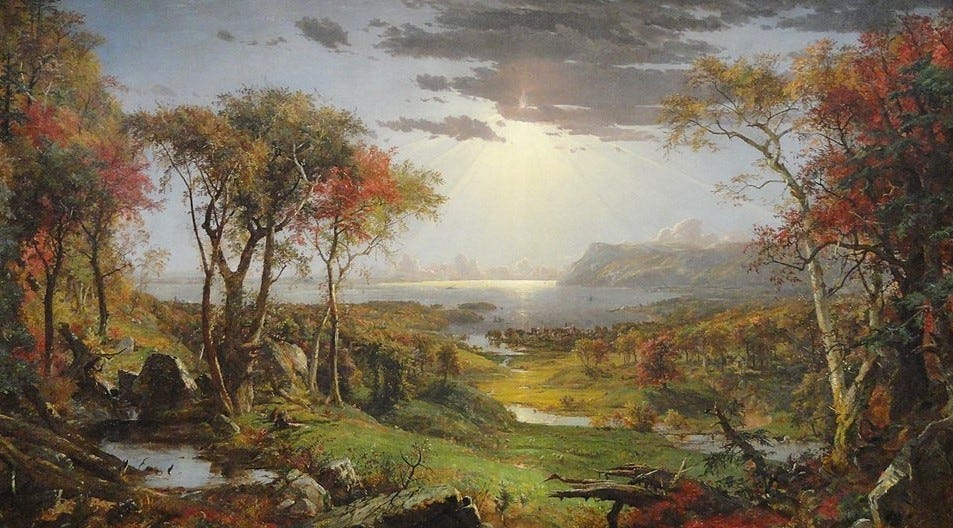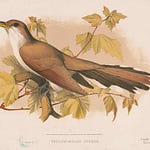Our back-to-school discount is still on at Word & Song, good for new paid and upgraded subscriptions as well as gifts (for the students, teachers, homeschoolers, and just about anyone who might enjoy our magazine).
Some works of art are magnificent beyond their flaws — I think that Melville’s Moby-Dick is like that, and it may be so of all works that stretch man’s powers to the utmost. “No one ever wished it longer,” said Dr. Johnson, about Milton’s Paradise Lost. But then you sometimes find a work which is perfect, flawless in its kind, and yet not little, either, but as sublime as the great epics. Such a poem is John Keats’ three-stanza ode, “To Autumn.”
It was one of the last things Keats ever wrote, as he was dying of consumption, what we call tuberculosis. He barely made it to the age of twenty-five. Yet that young man of immense intelligence and deep feeling had known very well that his life was going to be short, and in this poem we get his manly acceptance, not of the inevitability of death, but of the beauty of things that pass away, even in their last lingering among us. Spring is beautiful, but so is autumn. And it is not a sentimental splash of color that he gives us. The stanzas move from a summer-like bounty, nearby, in the middle of the day, to harvest-time, and beyond, with the fall of night, and the flying away of the swallows, and the sense that though life goes on, it does not go on for everything and everyone, and each of us will see that final sunset. All of this he shows us, without a trace of self-pity, without even a tear.
Notice, then, the lovely and sensitive art by which he proceeds. In the first stanza, we’ve got the vigor of early autumn and the full daylight, and the flowers are still blooming, so much so that even the bees seem to be fooled, thinking that “warm days will never cease.” But then it’s later in the season and the day, and the reaping has gone on, and the winnowing, and Autumn herself sits at the cider press, watching “the last oozings hours by hours.” And finally we get the end that is not really an end, with the small gnats borne aloft and sinking with the wind, and, as I’ve said, the twittering swallows, that do not spend the winter in England, but also the lambs now full-grown on the hillside. All is good; and so much the more precious to us, in that it has its coming and its going.
Season of mists and mellow fruitfulness,
Close bosom-friend of the maturing sun;
Conspiring with him how to load and bless
With fruit the vines that round the thatch-eves run;
To bend with apples the moss'd cottage-trees,
And fill all fruit with ripeness to the core;
To swell the gourd, and plump the hazel shells
With a sweet kernel; to set budding more,
And still more, later flowers for the bees,
Until they think warm days will never cease,
For summer has o'er-brimm'd their clammy cells.
Who hath not seen thee oft amid thy store?
Sometimes whoever seeks abroad may find
Thee sitting careless on a granary floor,
Thy hair soft-lifted by the winnowing wind;
Or on a half-reap'd furrow sound asleep,
Drowsed with the fume of poppies, while thy hook
Spares the next swath and all its twined flowers:
And sometimes like a gleaner thou dost keep
Steady thy laden head across a brook;
Or by a cider-press, with patient look,
Thou watchest the last oozings, hours by hours.
Where are the songs of Spring? Ay, where are they?
Think not of them, thou hast thy music too,--
While barred clouds bloom the soft-dying day,
And touch the stubble-plains with rosy hue;
Then in a wailful choir the small gnats mourn
Among the river sallows, borne aloft
Or sinking as the light wind lives or dies;
And full-grown lambs loud bleat from hilly bourn;
Hedge-crickets sing; and now with treble soft
The redbreast whistles from a garden-croft,
And gathering swallows twitter in the skies.Listen to this episode with a 7-day free trial
Subscribe to Word & Song by Anthony Esolen to listen to this post and get 7 days of free access to the full post archives.













